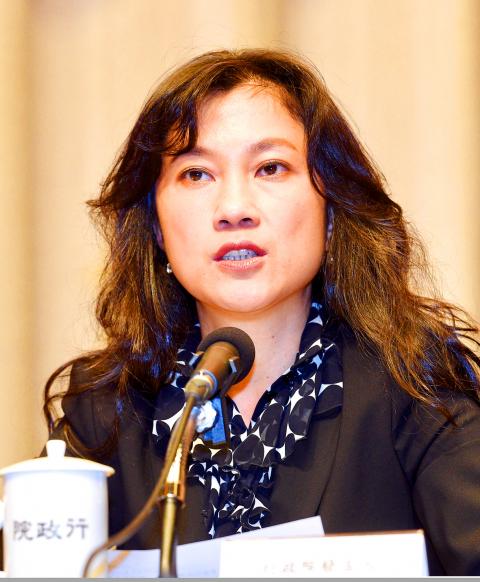The nation would no longer aim to become nuclear-free by 2025 in accordance with the result of Saturday’s referendum, Executive Yuan spokeswoman Kolas Yotaka said on Tuesday.
One of the 10 referendums Taiwanese voted on asked if they agreed that Article 95, Paragraph 1 of the Electricity Act (電業法), which calls for all nuclear power plants to stop running by 2025, should be abolished.
The results showed that 59.5 percent of the nearly 10 million people who voted are against abolishing nuclear power, Central Election Commission figures showed.

Photo: Peter Lo, Taipei Times
The Executive Yuan respects the result and would work with concerned ministries to re-evaluate the nation’s energy policies, Kolas said.
As such, the government would no longer regard 2025 as the deadline, she added.
After the 2011 Fukushima Dai-ichi nuclear power plant disaster in Japan, public opinion took a strong turn against nuclear energy, so the Democratic Progressive Party vowed to phase out nuclear power by 2025, Kolas said.
Although nuclear energy produces less air pollution, the problem of handling and storing nuclear waste remains a serious issue, she added.
The plan to realize a non-nuclear homeland would nevertheless remain the government’s goal for the foreseeable future, Kolas said.
Minister of Economic Affairs Shen Jong-chin (沈榮津) yesterday said that an updated national energy strategy would be formed in two months.
The Ministry of Economic Affairs has also instructed state-run Taiwan Power Co (台電) to submit a stay-of-decommissioning application for the Ma-anshan Nuclear Power Plant in Pingtung County’s Ma-anshan (馬鞍山) to the Atomic Energy Council before July, Shen told reporters on the sidelines of a question-and-answer session at the Legislative Yuan in Taipei.
Ma-anshan’s application is the most feasible, as there is still ample time before its original decommission date, he added.
As the schedule is much tighter for the Guosheng Nuclear Power Plant in New Taipei City’s Wanli District (萬里), a stay of decommissioning would only be considered when there is a power shortage, Shen said.
In keeping with voters’ wishes, the new strategy would prioritize renewable sources, energy conservation and nuclear power, Shen said.
However, the ministry would continue to work with the Executive Yuan to reach a consensus with those affected by the referendum’s outcome, he said, referring to opposition voiced by the Pingtung County Government.
Additional reporting by Ted Chen

A Ministry of Foreign Affairs official yesterday said that a delegation that visited China for an APEC meeting did not receive any kind of treatment that downgraded Taiwan’s sovereignty. Department of International Organizations Director-General Jonathan Sun (孫儉元) said that he and a group of ministry officials visited Shenzhen, China, to attend the APEC Informal Senior Officials’ Meeting last month. The trip went “smoothly and safely” for all Taiwanese delegates, as the Chinese side arranged the trip in accordance with long-standing practices, Sun said at the ministry’s weekly briefing. The Taiwanese group did not encounter any political suppression, he said. Sun made the remarks when

PREPAREDNESS: Given the difficulty of importing ammunition during wartime, the Ministry of National Defense said it would prioritize ‘coproduction’ partnerships A newly formed unit of the Marine Corps tasked with land-based security operations has recently replaced its aging, domestically produced rifles with more advanced, US-made M4A1 rifles, a source said yesterday. The unnamed source familiar with the matter said the First Security Battalion of the Marine Corps’ Air Defense and Base Guard Group has replaced its older T65K2 rifles, which have been in service since the late 1980s, with the newly received M4A1s. The source did not say exactly when the upgrade took place or how many M4A1s were issued to the battalion. The confirmation came after Chinese-language media reported

The Taiwanese passport ranked 33rd in a global listing of passports by convenience this month, rising three places from last month’s ranking, but matching its position in January last year. The Henley Passport Index, an international ranking of passports by the number of designations its holder can travel to without a visa, showed that the Taiwan passport enables holders to travel to 139 countries and territories without a visa. Singapore’s passport was ranked the most powerful with visa-free access to 192 destinations out of 227, according to the index published on Tuesday by UK-based migration investment consultancy firm Henley and Partners. Japan’s and

BROAD AGREEMENT: The two are nearing a trade deal to reduce Taiwan’s tariff to 15% and a commitment for TSMC to build five more fabs, a ‘New York Times’ report said Taiwan and the US have reached a broad consensus on a trade deal, the Executive Yuan’s Office of Trade Negotiations said yesterday, after a report said that Washington is set to reduce Taiwan’s tariff rate to 15 percent. The New York Times on Monday reported that the two nations are nearing a trade deal to reduce Taiwan’s tariff rate to 15 percent and commit Taiwan Semiconductor Manufacturing Co (TSMC, 台積電) to building at least five more facilities in the US. “The agreement, which has been under negotiation for months, is being legally scrubbed and could be announced this month,” the paper said,